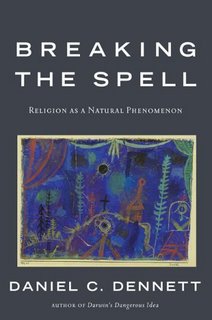
Ever since the poet John Keats expressed dismay at Newton's "unweaving the rainbow", people have been worried that the scientific examination of natural phenomena might somehow "ruin" that phenomena, that somehow the rainbow isn't as bright or beautiful if we know it is caused of millions of raindrops acting as prisms. Better to believe that it is a special God-created miracle, a symbol of God's covenant with Noah.
"Breaking the Spell" by Daniel C. Dennett is a deliberate attempt at subjecting religion to scientific evaluation. We all know that our own religion is, if not the only true religion, at least the best that God has revealed. It is the other guy's religion that needs fixing - or preferably replacing with our own. So Dennett, while admitting that such intense scrutiny may, in fact, "break the spell" we can no longer afford to let that possibility stop us from investigating.
Dennett's concern is that we are no longer a world of separate tribes and small nations where the most harm a religion can do is cause a congregation in Guyana to commit collective suicide or provide the rationale for a power-hungry dictator to commit genocide on a neighboring nation. We have always had religious fanatics willing to go to their death "defending the faith" and usually taking along a few of the faithless as well. No, we are now an interconnected world where those hoping for the "end days" have means at their disposal to hasten those days. And those of us who don't believe their interpretation of the Apocolypse just won't have a say in the matter any more.
Dennett's position is that any organized religion is a social organization that markets itself like any other business and that it should be analyzed as such - costs and benefits. Sure, there are those who may insist they have the "revealed truth" and don't care about such analyses but the rest of us do because what is a benefit to you may be a cost to me.
Typically, when such suggestions have been made, Dennett argues, religious people raise the cry that the only alternative to the black/white "we're right/you're wrong" dichotomy is moral relativism. Accepting moral relativism, which states that there is no absolute right and wrong, would allow everyone to have their own moral system and would be the end of civilization as we know it according to religionists.
Dennett refuses to accept such ideology, preferring instead to have a continuing dialogue on the merits (costs & benefits) of the differing beliefs rather than their inherent (revealed or assumed) truth. If we assume at the beginning that our moral values are RIGHT we get nowhere but if we assume that together we can FIND OUT what the best moral values are then we have a basis for discussion.
It takes a lot of stepping back from your own "things you JUST KNOW are SO" to be able to read "Breaking the Spell" but I challenge anyone to really claim it isn't a valuable exercise. If your religion is so weak that it can't stand some inspection and evaluation, it isn't much of a religion. And if your god can't field a few sincere questions, then you might as well join the Danish-flag-burning Muslims. Dennett wants you to know that questions will be asked and religions will be expected to defend themselves in the court of scientific evaluation.
No comments:
Post a Comment